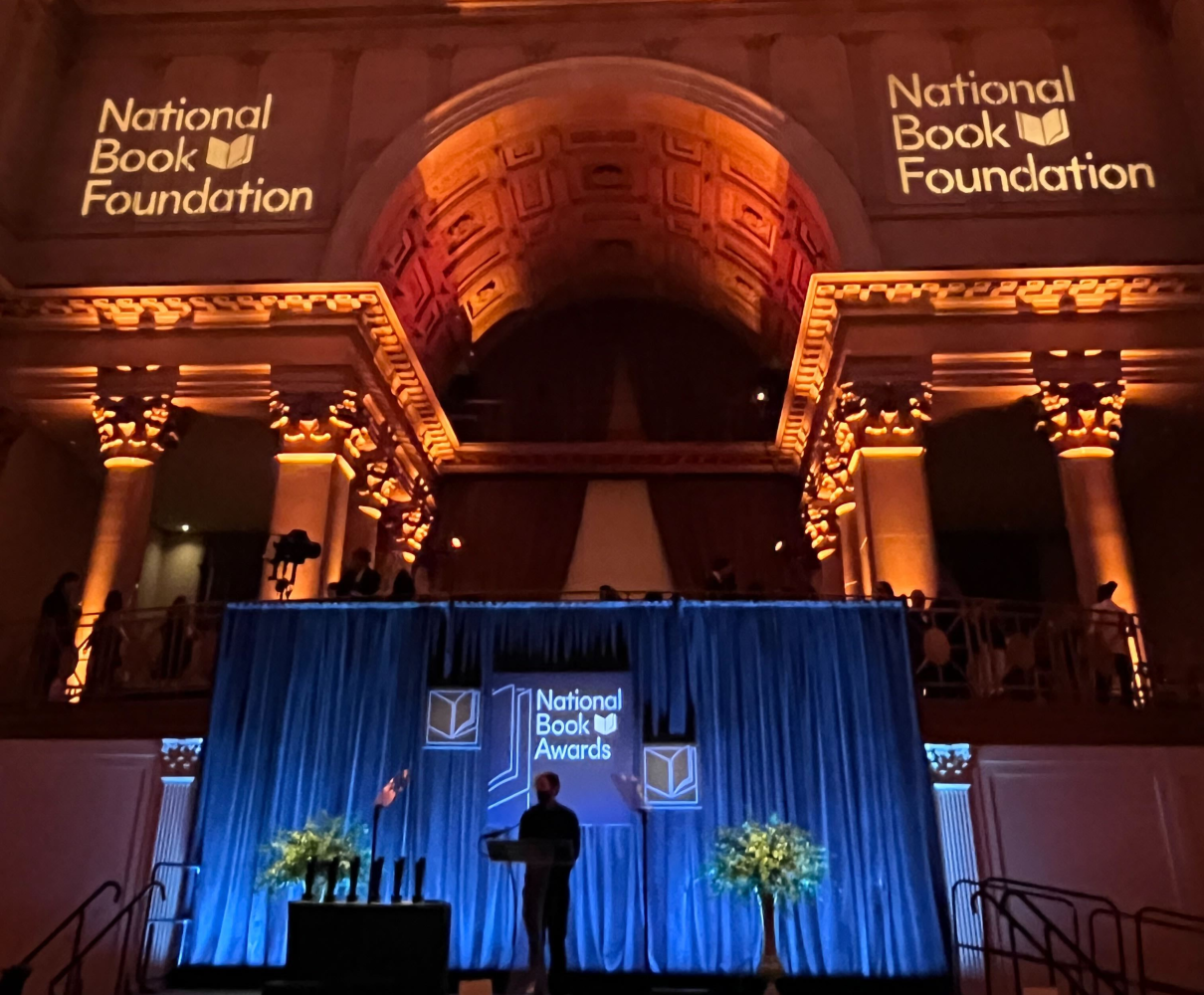news
We Partied With Padma Lakshmi, Union Supporter, at the National Book Awards
Prize-winning writers spoke out against book bans and censorship at the Oscars for books

The National Books Awards returned in full force on November 16, 2022 for a night of in-person glitz after two years of virtual ceremonies. In front of white tents where the literati gathered for photos on the red carpet, publishing workers with the HarperCollins Union, standing in the cold, handed out flyers and buttons about their fight for fair pay, better working conditions, and codified diversity inclusion. Unionized workers with the second largest publishing house have been on strike since November 10th after almost a year of failed negotiations.
Inside the venue, Cipriani’s on Wall Street, host Padma Lakshmi took the stage wearing a union button pinned to her ballgown, with a speech about the wave of book bans across America: “Deciding what books are in school libraries is the job of librarians, not politicians who want to continue to whitewash the country. I want my daughter to have access to what was missing from my classroom: the truth and not just the truth that isn’t painful.”
Padma Lakshmi took the stage wearing a HarperCollins union button pinned to her ballgown with a speech about the wave of book bans across America.
Dr. Ibram X Kendi announced the Literarian Award for Outstanding Contribution to the American Literary Community to Tracie D. Hall. He spoke about the late senator John Lewis who as a child growing up in segregated Alabama wasn’t allowed to attend local libraries. Kendi, author of Stamped: Racism, Antiracism and You, a target of book bans, denounced “tyrants taking away our right to read,” and called on the American literary community as a whole to be a vehicle and driver of justice.
Hall, the first Black woman to lead the American Library Association, dedicated her award to her grandmother Bessie Marie Sanders-Scott: “For her that her granddaughter can grow up in a library is an act of reparation.” A former librarian, she lauded her fellow librarians who “are resisting censorship efforts to ensure every reader has the chance to see themselves represented on bookshelves. Let history show that librarians were on the frontlines of upholding our democracy.” She continued her speech saying, “Tonight is a refection of two groups of people: people who long to read and people who fight for the right to read. The right of reading is being politicized and weaponized that contemporary acts of censorship surpassed the McCarthy Era, books itself have become contraband. Information wants to be free. Free people read freely.”
‘Free people read freely.’
Tracie D. Hall
Neil Gaiman presented The Medal for Distinguished Contributions to American Letters to his friend and Pulitzer Prize-winning cartoonist Art Spiegelman: “Art is a mensch, but he is a genius… He combines visual art with literary art and he makes magic.” With his signature self-depreciating wit, Spiegelman joked that he was so terrified of putting together a speech that he contemplated sending a suicide note instead, but had writer’s block: “Against all odds, Maus became a blockbuster. It was rejected by every publisher in town. Now they’re letting cartoonists into the great hall of literature. Maus was never made to teach anyone but me anything. To understand parents who were suppose to be dead long before I was born.” Gaiman’s Absolute Sandman and Spiegelman’s Maus are the most banned and challenged graphic novels in the country and both authors have been actively involved with Pen America to protest against book restrictions in schools. Referencing how his book about the holocaust has become a cause célèbre, Spiegelman warned: “as the clouds of fascism gather over a frying planet, perhaps Maus can be a cautionary tale: Never again.”
The National Book Award for Young People’s Literature was awarded to Sabaa Tahir for All My Rage, a Pakistani American love story set in a small desert town. Through tears, Tahir remarked: “I’m the first Muslim and Pakistani woman to win this award. I honor my Muslim sisters who are fighting for their lives, their autonomy and their bodies, and their right to tell their own stories. Sisters, may you rise above your oppressors.”
‘I honor my Muslim sisters who are fighting for their lives and their right to tell their own stories. Sisters, may you rise above your oppressors.’
Sabaa Tahir
Author Samanta Schweblin and translator Megan McDowell were jointly awarded the National Book Award for Translated Literature for the short story collection Seven Empty Houses. In a conversation with Halimah Marcus earlier in the evening, Scweblin mentioned that Electric Literature was one of the first magazines to support her work. We published her short story “Birds in the Mouth” from the collection Mouthful of Birds in Recommended Reading back in 2012. In their speeches, McDowell said “Writers are people who question words, distrust them, and demand more from them. Any act of communication is an act of translation,” while Schweblin reflected on trickiness of words: “Words can be misleading and even harmful. And we need to be very careful. But then someone calls you from back home and says even if you have to dress up tonight, make sure you don’t get cold—keep warm and be happy. And then words become a gift and a privilege.” Read “None of That” from the collection here.
John Keene was the recipient for The National Book Award for Poetry for Punks: New and Selected Poems, published by the small press The Song Cave: “I want to honor my ancestors by lineage and by association—the Black, gay, queer, and trans writers. Especially those who we lost to HIV/AIDs in the ’80s and ’90s. They were brilliant, they were fierce, they were courageous. Let’s return to their words and the words of so many vital writers we may have forgotten.”
‘For the hungry, the caged, the disregarded, the holding on—I write for you. I write because I love sentences, and I love freedom more.’
Imani Perry
South to America won The National Book Award for Nonfiction, a book about how the history of slavery, racism, and activism in the South has shaped the entire country. In her lyrical and rousing speech, Imani Perry proclaimed: “I write for my people. I write because we children of the lash-scarred, rope-choked, bullet-ridden, desecrated are still here, standing. I write for the ones who clean the toilets and till the soil and walk the picket lines. For the hungry, the caged, the disregarded, the holding on—I write for you. I write because I love sentences, and I love freedom more.” Read an interview with Perry here.
Debut novelist Tess Gunty took home the National Book Award for Fiction for The Rabbit Hutch, a book about a murder in a low-income housing complex in Indiana. Not expecting to win, she didn’t prepare a speech saying: “I truly believe that attention is the most sacred resource that we have to spend on this planet. Books are perhaps one of the last places where we spend this resource freely and where it means the most.” Read an interview with Gunty here.
Thus concluded a night of revelry where we celebrated diversity, lauded the work of librarians and denounced the rise of book bans. And of course, we had to party with Padma Lakshmi at the afterparty who told us to raise a glass to books. Salute!








